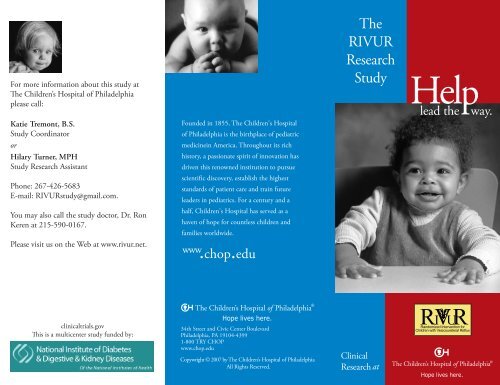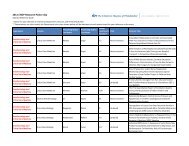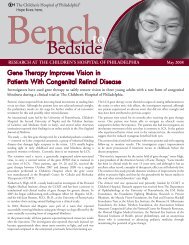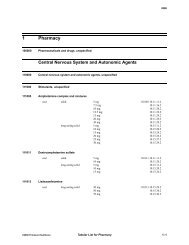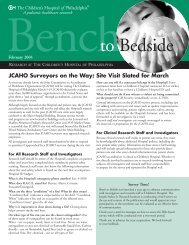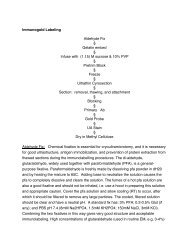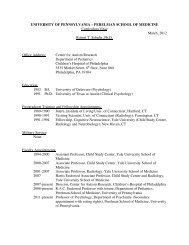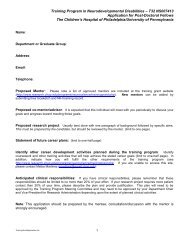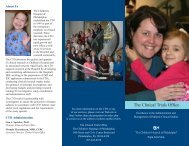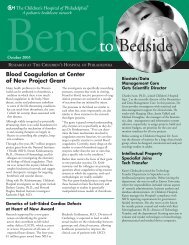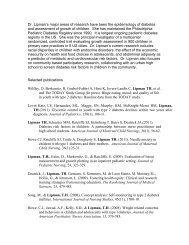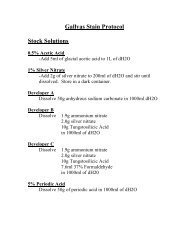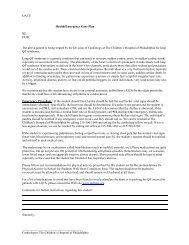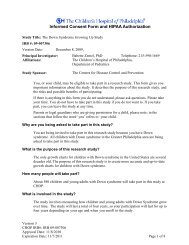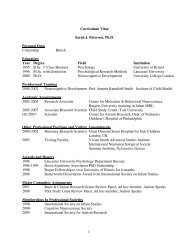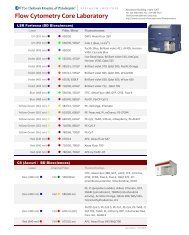The RIVUR Research Study - The Children's Hospital of ...
The RIVUR Research Study - The Children's Hospital of ...
The RIVUR Research Study - The Children's Hospital of ...
Create successful ePaper yourself
Turn your PDF publications into a flip-book with our unique Google optimized e-Paper software.
For more information about this study at<br />
<strong>The</strong> Children’s <strong>Hospital</strong> <strong>of</strong> Philadelphia<br />
please call:<br />
Katie Tremont, B.S.<br />
<strong>Study</strong> Coordinator<br />
or<br />
Hilary Turner, MPH<br />
<strong>Study</strong> <strong>Research</strong> Assistant<br />
Founded in 1855, <strong>The</strong> <strong>Children's</strong> <strong>Hospital</strong><br />
<strong>of</strong> Philadelphia is the birthplace <strong>of</strong> pediatric<br />
medicinein America. Throughout its rich<br />
history, a passionate spirit <strong>of</strong> innovation has<br />
driven this renowned institution to pursue<br />
<strong>The</strong><br />
<strong>RIVUR</strong><br />
<strong>Research</strong><br />
<strong>Study</strong><br />
Help<br />
lead the way.<br />
Phone: 267-426-5683<br />
E-mail: <strong>RIVUR</strong>study@gmail.com.<br />
scientific discovery, establish the highest<br />
standards <strong>of</strong> patient care and train future<br />
leaders in pediatrics. For a century and a<br />
You may also call the study doctor, Dr. Ron<br />
Keren at 215-590-0167.<br />
Please visit us on the Web at www.rivur.net.<br />
half, <strong>Children's</strong> <strong>Hospital</strong> has served as a<br />
haven <strong>of</strong> hope for countless children and<br />
families worldwide.<br />
www .chop.edu<br />
clinicaltrials.gov<br />
This is a multicenter study funded by:<br />
34th Street and Civic Center Boulevard<br />
Philadelphia, PA 19104-4399<br />
1-800 TRY CHOP<br />
www.chop.edu<br />
Copywright © 2007 by <strong>The</strong> Children’s <strong>Hospital</strong> <strong>of</strong> Philadelphia<br />
All Rights Reserved.<br />
Clinical<br />
<strong>Research</strong> at<br />
<strong>RIVUR</strong><br />
Randomized Intervention for<br />
Children with Vesicoureteral Reflux
What is Vesicoureteral Reflux (VUR)?<br />
During urination, urine normally flows from the<br />
bladder down through the urethra and out <strong>of</strong> the<br />
body. In children with VUR, urine also flows in<br />
the wrong direction. This happens when it flows<br />
from the bladder back up through the ureters and<br />
towards the kidneys. VUR is present in 30 to 40<br />
percent <strong>of</strong> children who have had a urinary tract<br />
infection (UTI). VUR is thought to increase the<br />
risk <strong>of</strong> developing kidney damage when children<br />
have repeat UTIs. Doctors diagnose VUR using<br />
a special radiology test called a VCUG (voiding<br />
cystourethrogram).<br />
How is VUR normally treated?<br />
Children who have a UTI and are found to have<br />
VUR are usually treated with a small daily dose<br />
<strong>of</strong> antibiotic to try and prevent repeat UTIs and<br />
kidney damage. However, children on preventive<br />
antibiotics can still get UTIs. Also, there have<br />
been no well-designed research studies to show<br />
that antibiotics are actually helpful in preventing<br />
repeat UTIs or kidney damage. A disadvantage<br />
<strong>of</strong> taking a daily dose <strong>of</strong> antibiotic for a long<br />
time is that children can develop resistance to<br />
that antibiotic and may need to take a different<br />
antibiotic to treat future infections. Early<br />
diagnosis and treatment <strong>of</strong> UTIs may be all that<br />
is needed to prevent damage to the kidneys.<br />
What is the <strong>RIVUR</strong> research study?<br />
<strong>The</strong> <strong>RIVUR</strong> research study is designed to find out<br />
whether preventive antibiotics really add any benefit<br />
in preventing UTIs and kidney damage when<br />
children have close follow-up and early diagnosis<br />
and treatment. To answer this question, half <strong>of</strong> the<br />
children in the study will be assigned by chance (like<br />
tossing a coin) to take daily dose <strong>of</strong> antibiotic. <strong>The</strong><br />
other half will take a placebo (a liquid that looks<br />
like the antibiotic but has no effect on the body).<br />
All children in the study will receive excellent care<br />
with very close follow-up so that repeat UTIs can<br />
be diagnosed and treated right away. Also, all <strong>of</strong><br />
the children will have periodic imaging studies and<br />
blood and urine tests to closely follow their kidney<br />
function.<br />
What happens if I take part in <strong>RIVUR</strong>?<br />
<strong>RIVUR</strong> is a two-year study. If you take part, we will<br />
ask you to:<br />
l Give your child the study medication once a<br />
day every day<br />
l Come to 5 study visits (1 visit every 6<br />
months) at either <strong>The</strong> Children’s <strong>Hospital</strong> <strong>of</strong><br />
Philadelphia or <strong>The</strong> Children’s <strong>Hospital</strong><br />
Specialty Care Center in King <strong>of</strong> Prussia.<br />
l Be contacted by phone every 2 months to<br />
update us about your child’s health<br />
At ALL <strong>RIVUR</strong> study visits we will:<br />
l Do a basic physical exam and go over your<br />
child’s recent medical history<br />
l Ask you to complete a short questionnaire<br />
about how UTIs and VUR affect your<br />
child’s quality <strong>of</strong> life<br />
l Compensate you for your time and travel<br />
At SOME <strong>RIVUR</strong> study visits we will<br />
l Take pictures <strong>of</strong> your child’s kidneys<br />
(through a special test called a renal scan) to<br />
look for the development <strong>of</strong> kidney damage<br />
l Obtain blood and urine to monitor your<br />
child’s kidney function and response to the<br />
study medication<br />
l Obtain a small stool sample to check for the<br />
development <strong>of</strong> resistant bacteria<br />
l Do a VCUG (voiding cystourethrogram)<br />
at the end <strong>of</strong> the study to see if the VUR has<br />
decreased or disappeared<br />
Clinical <strong>Research</strong> at


